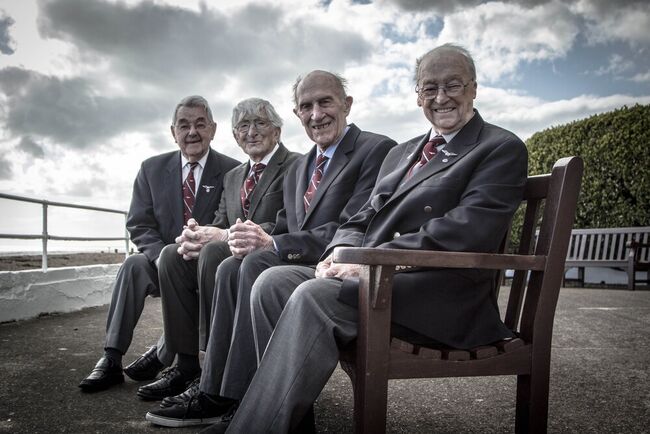
Third and final episode of Guinea Pig Club podcast launches
Published:
Categories:
Last month, we launched the third series of our All Stations podcast, exploring the history of the Guinea Pig Club, a group of allied airmen who suffered life-changing burns and injuries during the Second World War. The three-part mini-series was created to celebrate the 80th anniversary of the Club and to ensure its legacy lives on.
Originally founded as a drinking club, the Guinea Pig Club took its name from the pioneering surgery members underwent at the Queen Victoria Hospital in East Grinstead under Sir Archibald McIndoe. McIndoe’s hospital became renowned around the world and his techniques went on to inspire modern plastic surgery. Crucially, McIndoe focused on healing not only patients' physical scars, but their emotional wellbeing too.
In the first episode of the mini-series, historian Victoria Taylor introduces the story of the Club and hears first-hand accounts from those who set it up. She interviews Andrew Perry, the son of Jack Perry, the youngest member of the Guinea Pig Club, and speaks to Dr Emily Mayhew, a military medical historian.
Emily said: "If you want to know how to treat military veterans who are dealing with the lifetime consequences of injuries sustained during warfare, then all the answers to your questions are right there in the history of the Guinea Pig Club."
In episode two, Line of Duty writer and ex-RAF doctor Jed Mercurio speaks to Fund ambassador Mike Goody and actress Fiona Dolman, whose father served in the RAF. The episode explores the Guinea Pig Club's parallels with the CASEVAC club, a group of servicemen and women who were wounded during tours of Afghanistan and Iraq.
Jed, a former RAF doctor, said: "I initially pursued a career in aviation medicine with the RAF, so the story of the Guinea Pig Club fascinates me. McIndoe's plastic surgery techniques revolutionised burns treatments and changed the lives of so many more than those he treated at East Grinstead. He saw that healing physical wounds was only one part of the job – to return a serviceman to a fully functioning member of society they needed a lifetime emotional support network.
"The Second World War was a unifying event and there was a sense of heroism around the Guinea Pig Club. Since then, conflict has been much more divisive and there's no national consensus around the UK's role in Afghanistan and Iraq. This perception of whether military campaigns were justified must be very alienating and isolating and could make an injured veteran think long and hard about whether the situation they're in was worth it – a dangerous headspace to be in."
In the third and final episode of the mini-series, which launched today, leading plastic surgeon Dr Alex Crick is interviewed by aviation historian Victoria Taylor. Alex has operated on many of the most seriously injured veterans from the conflict in Afghanistan, including members of the CASEVAC Club, the Guinea Pig Club's modern-day equivalent. Taking its name from the military term for 'Casualty Evacuation', the group is formed of servicemen and women seriously wounded in Iraq and Afghanistan and was created in the Guinea Pig Club's image.
Alex said: "McIndoe was one of the founding fathers of modern plastic surgery. He was ahead of his time. He understood the psychological impact of physical injury and the value of treating this alongside the physical injury, an approach that has influenced my work. If a patient comes to me with a list of problems, some physical and some psychological, addressing the physical problems can make the psychological ones easier to deal with, alleviating the overall burden.
"The Guinea Pig Club is an important reminder that plastic surgery has made some of its greatest advances with those injured in war and as with the Second World War, the conflicts in Iraq and Afghanistan have contributed hugely to medical knowledge. I would argue that this is probably the most significant legacy of those conflicts. It has improved our care of trauma in the UK and will save many lives for years to come."
The Guinea Pig Club mini-series is the RAF Benevolent Fund’s third series of its All Stations podcast and can be listened to at rafbf.org/allstations, on Apple and Google Podcasts, Spotify, or your preferred podcast app.